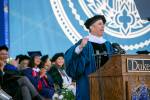A newsman defined by fight, fearlessness
"I may be the only reporter you have who was held hostage by the Ku Klux Klan — twice in one night," A.D. wagered.
That was back in Virginia in the mid-1960s, when he and his brother John, who I worked with in Miami 20 years ago, were reporters for two different newspapers covering a brief resurgence of the notorious white-robed fraternity. Klansmen detained them after they were seen interviewing people picketing the rally, but the Grand Dragon said, "I think these guys are OK," and they were allowed to leave.
Later that night in a restaurant, everyone got up and left except the Klansmen, who again surrounded the reporters and started berating them. John got angry with them, as A.D. recalls, and managed to talk their way out of it. "John’s not scared of much."
Neither is A.D. Hopkins, who on Saturday was inducted into the Nevada Newspaper Hall of Fame at the Nevada Press Association convention in Pahrump in recognition of his four decades of superlative journalism in Nevada, more than three of those with the Review-Journal.
Because he wanted to be a novelist, but realized most good novelists — like Mark Twain, also a member of the exclusive Hall of Fame club — started out as newspaper reporters, A.D. went to work as a copy boy in 1963 and later as a reporter for several Virginia and North Carolina newspapers.
He came west in 1969 to work for the Las Vegas Sun, planning to spend a year and move on to another Western state.
He never left.
After four years at the Sun, he spent four more at the Valley Times as managing editor before coming to the Review-Journal to edit the popular "Nevadan" Sunday supplement magazine for 12 years. In between stints as a special projects investigative reporter and editor he also edited the company’s short-lived "Cerca" travel magazine and was co-author of "The First 100," a 1999 book about 100 founders of Las Vegas in its first century. He also was the first editor for Stephens Press, the company’s book publishing division.
But it was the daily journalism he practiced that prompted changes.
One of his first assignments as a special projects reporter was to find out just how much UNLV’s legendary basketball coach Jerry Tarkanian was being paid. He discovered the coach was among the highest paid of state university coaches. About that time the newspaper was made aware of less than savory characters hanging around the basketball program and its players, including one known as Richard "Richie the Fixer" Perry, who had comped seats at Rebels games.
As someone once told A.D., "There’s only been five guys convicted under the federal law against fixing sporting events, and Richie’s two of them."
Then a tipster handed A.D. a photograph of Perry with several Rebel basketball players in a hot tub. This erupted into a storm of accusations between the team’s boosters and university management, resulting in Tarkanian resigning as coach and later the president of the university moving on. Someone posted a $30,000 reward for the identity of the source of the photo. A.D. was followed and his home put under surveillance. The source remained a secret for more than a year until he voluntarily stepped forward.
In 1990, A.D. led a team of reporters that detailed the death of a low-level casino executive who died as a result of being choked by Las Vegas police, resulting in a change in police policies and procedures.
In 1992, he launched the first of the newspaper’s biennial surveys of lawyers to evaluate judges and has been in charge of most of them since. The survey has resulted in a number of poorly rated judges deciding to retire and several being replaced by the voters.
A.D. in 1993 took on the Nevada Supreme Court, which was trying to secretly derail the ethics investigation of a popular Washoe County judge. For three years, the Review-Journal was nearly alone in covering the closed-door intrigue, usually using anonymous sources who feared for their legal careers. The high court hired a special master who unsuccessfully attempted to ferret out the paper’s sources.
In the end, the Washoe judge resigned under a deal to avoid federal prosecution and two Supreme Court justices retired rather than again face the voters.
A.D. recalls waking every morning during that years-long ordeal thinking, if great-grandfather Aaron DeHart, for whom he is named, could follow Robert E. Lee and Jubal Early for four years, then he could follow this.
He later learned his grandfather only followed them for five months.
In more recent years, A.D.’s special projects team has reported stories that resulted in changes — from sealed court cases to indigent defenders to resort building inspections.
He says he once interviewed a veteran of World War I about fighting the War to End All Wars only to see another break out in only 23 years. "Whaddaya want? It worked for 23 years!" the veteran replied.
"I no longer expect my reporters to change the world permanently," A.D. says. "I just want them to come out fighting in the next round."
Thomas Mitchell, editor of the Review-Journal, writes about the role of the press and access to public information. He can be contacted at 383-0261 or via e-mail at tmitchell@reviewjournal.com. Read his blog at lvrj.com/blogs/mitchell.
A.D. Hopkins: Newspaper Hall of Fame inductee

















